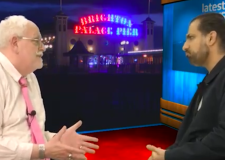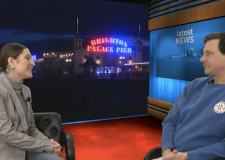Army man Adrian Twyning takes on Brighton A&E challenge
Adrian Twyning faced grenades in Iraq. Now he’s trying to sort out the problems facing the Royal Sussex A&E.
Frank le Duc reports

Aformer executive at the Royal Sussex County Hospital once described Adrian Twyning as the sort of person who ran towards trouble, not away from it. After all, Mr Twyning, 36, spent four years as an Army lawyer, serving in Iraq. And after a year running maternity services and the Royal Alexandra Children’s Hospital in Brighton, he is turning his attention to the Accident and Emergency Department (A&E).
As associate director of operations for medicine he is responsible for more than just the Emergency Department. But it’s A&E that’s been in the news. Brighton and Sussex University Hospitals NHS Trust, which runs the Royal Sussex, declared a crisis in January. The hospital asked for external support. And the official watchdog, the Care Quality Commission (CQC), has since carried out an inspection and flagged up concerns.
Mr Twyning said: “When I joined the NHS I was really keen to do more frontline managerial work, replicating what I did with the Army. We have had good performance over the past couple of months but we have to have a model that is sustainable and resilient. We’ve put a project plan in place. I’ve got to work with our consultants and nurses and make sure the processes are working. The test is likely to come next winter.”
Asked what kind of changes are being made, Mr Twyning said that the number of consultants working in A&E would rise from 16 to 19. More nurses would be recruited. But it wasn’t all about spending more money, he said, adding: “We’re trying to make sure that medical decisions are made closer to the front door.” The beneficial side effect of this should be to cut waiting times – or at least prevent them from lengthening.
Many of the challenges faced by Mr Twyning and his colleagues at the Royal Sussex are presenting problems in other hospitals too. The number of people attending A&E has been rising across the country since a new contract with GPs – or family doctors – was agreed in 2004. Responsibility for looking after patients out of hours switched from GPs to relatively anonymous health commissioners.
Public understanding of the current system – and public trust – is poor. As a result many more patients are opting to go straight to hospital, especially at night and over weekends. The numbers coming into A&E in Brighton alone have risen by a quarter in just five years. And being a party town with a lively night life has added to the pressure as any visitor to A&E on a Friday or Saturday night can testify.
Hospitals are not cheap to run. Governments of all hues have been trying to encourage a shift towards more care in the community for more than 20 years. But as Mr Twyning wrote in an essay on the future of the NHS for the Fabian Society: “Many at the moment feel overwhelmed, with increasing numbers of older patients accessing GPs and attending hospital, often presenting with increasingly high complexity and dependency.”
How to tackle the bigger picture? Mr Twyning ran for the Labour nomination in Hove, hoping to become the party’s candidate at the next general election. Perhaps as the newest and youngest of the three men on the shortlist, it shouldn’t be a surprise that he was unsuccessful this time. One Labour supporter said: “He has the potential and the credentials to become an excellent MP but it’s not as if he doesn’t have enough on his plate at the moment.”
The married father of two had every confidence that he could keep work and politics separate and find time for both. He is a firm advocate of people with a good track record in public service putting themselves forward for a role in political life. As someone who has worked as a private sector lawyer, served in the Army and run a hospital, he has plenty to offer.
Mr Twyning described working with judges in Basra in Iraq in 2007, trying to help re-establish the rule of law, speed up court cases and safeguard human rights. The lawyer’s world of words and the rocket-propelled grenades (RPGs) of the ever-moving frontlines gave life there a dangerous edge. He said: “I’ll never forget being flown up to Baghdad and being shot at with RPGs.”
He has now tasted four years of life in the NHS after serving for four years in the Army. He said of his time in Iraq: “I’m really proud of what we did there in really difficult circumstances.” Many will hope that Mr Twyning will be able to say the same thing after Brighton’s A&E has faced its next testing surge.





















